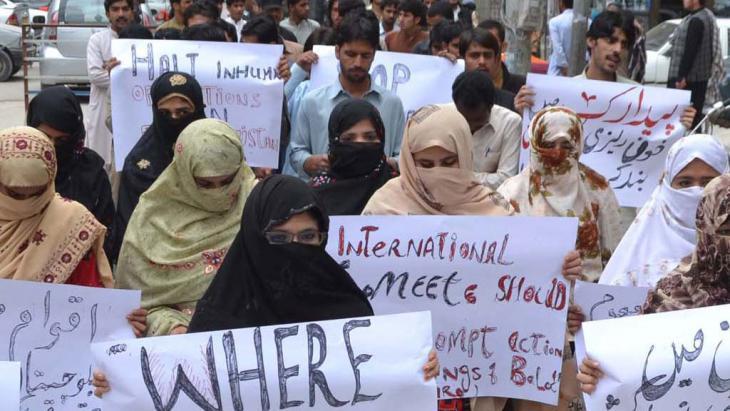Balochistan is the largest province of Pakistan with a vast area stretching from Afghanistan in the North to Iran in the West. Balochistan has had a long and embattled history of insurgency, violence and pillage undertook not just by the Pakistani government but also intersectoral groups that have emerged in the region since the formation of the Pakistani State. While it is important to note that Balochistan is governed by both Iran and Pakistan, the largest chunk of the portion is controlled by the Pakistani government. The region is characterised by its oil, gold and copper reserves which generate about a billion dollars per year for the federal government of Pakistan without its revenues reaching the province at all.
Balochistan province has had a long history of separatist uprisings fought by Baloch Nationalists and the government of Pakistan since the late 1940s. With each uprising, countless instances of human rights abuse have been reported by various international organisations including the Human Rights Commission of Pakistan, which has categorically condemned the Pakistan state for the handling of these insurgencies.
Key Actors in the Balochistan Conflict
The Baloch province has a diverse array of communities residing in close proximity with each other ranging from Sindhis, Shias, Sunnis and even a sizable Punjabi population. The mix of economic backwardness, massive human rights violations and cultural differences have led to the rise of mostly secular activist groups within the province that are demanding their independence from Pakistan. Baloch nationalism arose from the formation of Anjuman-e-Ittehad-e-Balochan which later evolved into the Kalat State Party. The peaceful and secular nature of separatist groups have been overshadowed by militant organisations such as the Baloch Liberation Army, Baloch Liberation Front, Tehrik-e-Taliban and Lashkar-i-Jhangvi which have been targeting the Zikris, Hazaras and Hindu population of the province. As reported by Pakistan’s National Commission of Human Rights, over the last 7 years, 509 members of the Hazra community have been killed and hundreds more have been injured in Quetta, the capital of the Baloch province alone.
There is a deep sense of internalised colonialism and its sheer rejection by the Baloch community which they see being manifested on all fronts by the government of Pakistan. A major grievance is the management of Gwadar port which is entirely controlled by the central government, depriving the province of much needed economic rejuvenation that could potentially revitalise the region. The conditions of living are so terrible in the region that according to a study done in 2017 by Manzoor Ahmed and Akhtar Baloch, about 90% of the population in Baloch province do not have access to clean drinking water which is far below the national average. Renowned journalist Malik Siraj Akbar, who was exiled from Pakistan for expressing dissent, notes that several people are being killed in the region, every single day.
Thousands remain missing in Balochistan
In 2013, Mama Qadeer, a resident of the province led a 2000km long protest march to Islamabad to bring to light the anger that had been bubbling within the Baloch people over their missing family members. Over the years, as HRCP reports, upwards of 47,000 Baloch residents have either disappeared or gone missing. The official number given out by the centre is approximately 2,000 civilians which are nowhere close to those reported by other organisations.
In international law, enforced disappearances are a violation of multiple rights of a person including the right to liberty and security, protection from torture and the right to recognition as a person before the law. As the Pakistani government has ratified both International Covenant on Civil and Political Rights (ICCPR) and the Convention against Torture and Other Cruel, Inhuman or Degrading Treatment or Punishment (Convention Against Torture) it is required to protect these rights of its citizens.
The sectarian violence and military operations have intensified in areas like Awaran, Kech and Panjar during the COVID-19 pandemic. Sixteen Balochis were killed in a military raid in April and about 73 people were picked up by government forces including infants. While the exact number of enforced disappearances has not been determined yet, the data collected by independent and international organisations show a consistent pattern of enforced disappearances of Baloch residents by the Pakistani military and paramilitary forces on grounds of suspicion of their involvement with the Baloch Nationalist Movement.
The presence of secret detention facilities in Pakistan is perhaps not a piece of common knowledge to the international community but the Kulli camp in Quetta has recently come under scrutiny as former detainees allege torture. It must be noted that despite some international uproar, there has been no investigation undertaken by the centre into the matter.
With the addition of the China-Pakistan Economic Corridor and the impending sense of suspicion and anger within the Baloch community, this initiative is also viewed with an eye of suspicion as the Baloch community sees this as an attempt to bring in foreign identities to further colonise the Baloch province.
The great powers continue to be silent over the human rights violations, arbitrary and enforced detentions and violence undertaken by state-sponsored terror outfits in Balochistan. Pakistan blames a majority of the instability in the province to external interference in its state matters.

